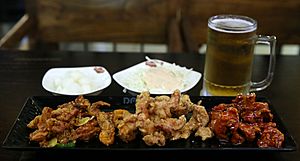Chimaek facts for kids

A typical chimaek combination
|
|
| Course | Main course |
|---|---|
| Place of origin | South Korea |
| Associated national cuisine | Korean cuisine |
| Invented | 1970s |
| Main ingredients | Korean fried chicken, beer |
| Chimaek | |
| Hangul |
치맥
|
|---|---|
| Revised Romanization | Chimaek |
| McCune–Reischauer | Ch'imaek |
| Alternate name | |
| Hangul |
치킨맥주
|
| Revised Romanization | Chikin-maekju |
| McCune–Reischauer | Ch'ik'in-maekchu |
Chimaek (치맥) is a super popular food combo from South Korea. It's a mix of Korean fried chicken and beer. People often enjoy it in the evening. You can find chimaek in many South Korean restaurants. There are even special restaurant chains just for it! The name chimaek comes from two Korean words: chikin (for fried chicken) and maekju (for beer).
Contents
How Chimaek Became Popular
A long time ago, about 600 years ago, there was a similar chicken recipe in Korea. But the chimaek we know today started more recently. It probably began in the late 1900s.
South Korea has always loved chicken dishes. They started with roasted chicken in the 1960s. Then they made spicy chicken to fit Korean tastes. As chicken became more popular, a new type of draft beer also became famous in the 1970s. Soon, people started putting chicken and beer together on menus.
Chimaek and the World Cup
The 2002 FIFA World Cup in Korea and Japan made chimaek even more famous. People would gather in parks to watch the games on big screens. They wore red clothes to support the home team. While cheering, they would eat fried chicken and drink beer. This made chimaek a big part of Korean get-togethers. After the World Cup, the number of chicken restaurants in Korea jumped from about 10,000 to 25,000!
Koreans love fried chicken so much that they even made a special word. They call it Chi-neunim. This word combines "chicken" with "Haneunim," which means "God" in Korean. It shows how much they adore chicken!
The History of Fried Chicken in Korea
Fried chicken has a long history in Korea. It was known as Pogye (포계) during the early Joseon dynasty. This recipe appeared in a cookbook called Sangayorok in 1459.
Chicken became much more common as Korea's economy grew. In 1971, cooking oil became widely available. With lots of chicken and oil, people could eat more fried chicken. Around this time, chicken and beer were often sold together. This led to the creation of chimaek. In the 1970s, a whole chicken cost about 3,400 Korean Won. A large glass of beer was about 450 Korean Won.
In 1977, a chicken brand called Rims Chicken started. It was new for Koreans to chop and fry chicken. But it quickly became very popular, especially during holidays.
Chimaek Festivals and Streets
Today, there are many chimaek festivals in Korea. The Seoul Chimaek Festival happens in mid-October in downtown Seoul. It helps share Korean food culture with the world. The city of Daegu also held a chimaek festival in 2013.
There are plans to build a special Chimaek Street in Gimpo, South Korea. This street will have many different chicken restaurants. It will also offer various kinds of beer. This will make it a unique spot in Gimpo city.
Chimaek Around the World
Chimaek is also very popular in China. This is partly because of a famous TV show called My Love From the Star. In the show, the main character said that a snowy day is perfect for chimaek. This made many people in China want to try it.
Soon, many special chicken shops opened in China. It became a trend to share pictures online. People would hold a piece of chicken in one hand and a beer in the other.
In December 2014, some Chinese people waited three hours to eat at a Korean chicken shop. When the TV show was popular, thousands of "Chicken Mac sets" were sold in Hangzhou. A store called Lotte Mart in China even gave discounts on chicken and Tsingtao beer.
Chimaek Restaurants
As more people wanted chicken and beer, the number of special chicken shops grew. By March 2014, Korea had 192 different chicken franchise companies. About 10% of these companies were known for their special recipes.
See also
 In Spanish: Chimaek para niños
In Spanish: Chimaek para niños
 | Calvin Brent |
 | Walter T. Bailey |
 | Martha Cassell Thompson |
 | Alberta Jeannette Cassell |

